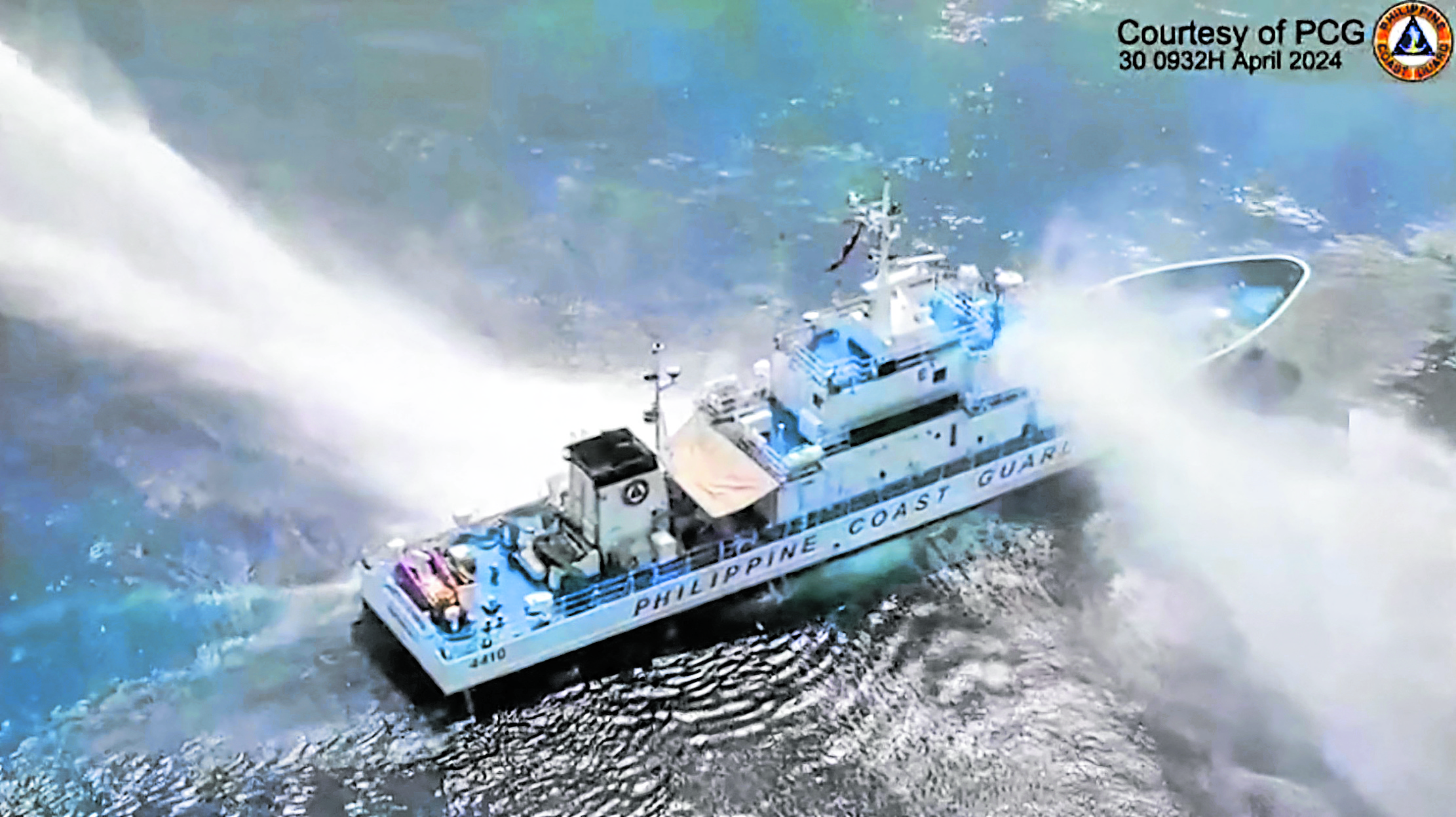
A frame grab from video footage released by the Philippine Coast Guard shows its ship, the BRP Bagacay, being hit by water cannon from Chinese coast guard vessels near the Chinese-controlled Scarborough Shoal in the West Philippine Sea. Also hit on its way to the shoal was the BRP Bankaw of the Bureau of Fisheries and Aquatic Resources. (AFP)
China has approved new regulations authorizing its coast guard to detain for up to 60 days without trial foreign trespassers who cross what it claims are its borders.
The Chinese Embassy in Manila has not yet released a statement on the matter but it gave reporters on Friday a copy of the 92-page document in Chinese.
The Inquirer used an online translator tool to read the document called “Provisions on Administrative Law Enforcement Procedures of Coast Guard Agencies,” which said that it was deliberated and adopted on May 15 and would take effect on June 15.
Under Chapter 14, which tackles the handling of administrative cases involving foreign parties, a provision states that foreigners suspected of violating China’s border laws may be detained if they are either suspected of illegally entering Chinese territory or exiting, or suspected of assisting others in illegal exit or entry.
‘Complicated cases’
The same provision indicates that those “suspected of endangering national security and interests, disrupting public order, or engaging in other illegal criminal activities” may also be detained for up to 30 days.
“For complicated cases, it may be extended to 60 days with the approval of the higher maritime police agency,” it said.
Chapter 2 says that China Coast Guard (CCG) would handle administrative cases occurring in “waters under the jurisdiction of our country.”
Its Article 266 allows its coast guard to seize foreign ships.
The South China Morning Post, the Hong Kong-based English-language newspaper, which first reported the new rules said on Thursday that Beijing had “fleshed out” the CCG’s powers to detain foreigners for illegally crossing borders and that it was the “first time a specific regulation has clarified the coast guard force’s law enforcement procedure for administrative detentions.”
PH civilian mission
The release of the document coincided with a Philippine civilian mission launched on Wednesday to assert Manila’s claims over the Panatag (Scarborough) Shoal, which is also called Bajo de Masinloc.
The convoy of fishing boats organized by the “Atin Ito” (This is Ours) Coalition, set sail from Masinloc, Zambales province, to distribute fuel and food to Filipinos who fish in the West Philippine Sea and to assert the nation’s rights over these waters, which are part of the country’s 370-kilometer exclusive economic zone (EEZ).
Beijing seized complete control over the shoal, about 230 km west of Zambales, in 2012 and often drives away Filipino fishers from its waters, especially its lagoon, which are traditional Philippine fishing grounds.
Reacting to the civilian mission, the Chinese foreign ministry warned against the Philippines’ supposed infringement on “China’s territorial sovereignty and jurisdiction.”
It added that “China will safeguard its rights and take necessary countermeasures in accordance with the law.”
On May 1, two CCG ships blasted two Philippine Coast Guard (PCG) ships separately off the shoal with powerful water cannons, the latest in a series of such attacks. The Chinese foreign ministry said the Philippine vessels crossed into the shoal’s territorial limit of 22 km without permission.
‘Another intimidation’
The release of the new Chinese coast guard rules was “another intimidation” from China to discourage activities, such as those launched by the Atin Ito coalition, said PCG Commodore Jay Tarriela, spokesperson for the PCG on the West Philippine Sea.
He stressed that such regulation was just another “illegal action” by Beijing justified by its “imaginary” nine-dash-line claim to nearly all of the South China Sea.
An international arbitral tribunal ruled to nullify China’s “historical” claims to the strategic waterway in 2016 and upheld the Philippines’ sovereign rights to its EEZ.
Tarriela doubted the seriousness of the new Chinese regulation, which he said may rile up the international community, as it would not only affect the Philippines, but also other Southeast Asian countries whose maritime claims overlap with China’s.
Other claimants to various parts of the South China Sea are Vietnam, Brunei, Malaysia and Taiwan.
“I don’t think China is really serious in doing this because this would spark backlash against them, and most likely, more countries will criticize and stand up against this kind of illegal domestic law they passed without considering the implications in international law,” he said.
But Tarriela added: “The domestic law they passed will not deter the PCG and AFP (Armed Forces of the Philippines in protecting the interests of Filipino people.”
‘Stand down’
Opposition figures on Friday called on China to “stand down.”
In separate statements, House Deputy Minority Leader and ACT Teachers Rep. France Castro and Bayan Muna chair Neri Colmenares also urged the Marcos administration to file a new case against China in the Permanent Court of Arbitration and seek support from the Association of Southeast Asian Nations (Asean) to demilitarize the area.
“This is highly condemnable and is not even legal. China has no right to impose such a regulation. If any country has a right to arrest foreigners, it is the Philippines,” Castro said.
“China is the one trespassing in our territorial waters and our exclusive economic zone, and now it has the gall to say that they would arrest non-Chinese in our waters,” she added.
Colmenares said the Philippines and its Asean partners being bullied by China, like Vietnam and Malaysia, should file a multipronged case in the arbitral tribunal against China to stop its “growing belligerence in the region.” —WITH REPORTS FROM KATHLEEN DE VILLA AND KRIXIA SUBINGSUBING

